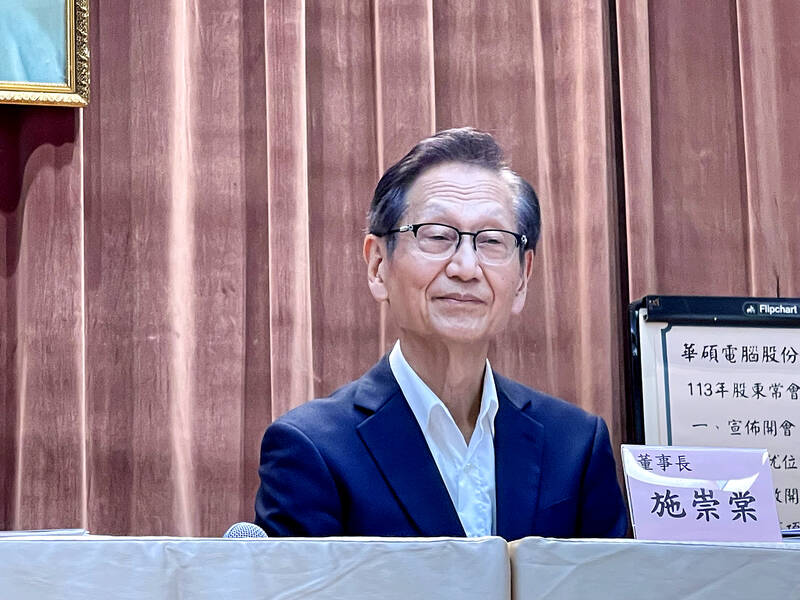PC vendor Asustek Computer Inc (華碩) yesterday said it is making better advances in expanding its server revenue over a five-year span to 2026, extending last quarter’s growth momentum.
Asustek fell behind its local peers in tapping into the server market, but its ambition to grow server revenue by five times within the 2022 to 2026 period looks more realistic after its strong performance in this year’s first quarter.
Server revenue increased several times last quarter from a year earlier to about NT$100 billion (US$3.1 billion), Asustek said.

Photo: Vanessa Cho, Taipei Times
“We are a latecomer to the server market, but we are making all-out efforts to achieve a better performance than we have announced,” Asustek chairman Jonney Shih (施崇棠) told reporters after the company’s annual shareholders’ meeting yesterday.
“There will be multiple times [of growth]. Besides, the timing is just ripe,” Shih said.
Asustek said it is confident that its server business would grow at a similar pace throughout this year, driven by robust demand for artificial intelligence (AI) servers.
The company counts some of the world’s major cloud server providers as its server clients.
Asustek said about 70 percent to 80 percent of its server revenue came from AI servers.
To play catch-up, Asustek has created a server team, which comprises more than 600 engineers.
The company said it aims to expand the team without giving any specific numbers.
Asustek said its server team is can compete with the nation’s major original design manufacturing (ODM) companies in developing high-quality products.
The company said it can equip servers with Nvidia Corp’s latest Blackwell GPU architecture.
Quanta Computer Inc (廣達), which makes AI servers powered by Nvidia’s AI chips, has the biggest server team among local ODM companies, with 2,200. Quanta aims to grow its server team by 10 percent this year to catch up with strong demand.
Asustek is also focusing on developing its AI robot ZenBo.
The company invested in AI robots a few years ago, but its development was “premature,” given inadequate computing power at the time, Shih said.
“There was no fundamental demand at the time, as it was not intelligent enough to interact with users,” Shih said. “Now, Asustek’s Zenbo can speak to users fluently and respond to their needs after being trained on big-language models”
“The timing is right,” he added.

NEW IDENTITY: Known for its software, India has expanded into hardware, with its semiconductor industry growing from US$38bn in 2023 to US$45bn to US$50bn India on Saturday inaugurated its first semiconductor assembly and test facility, a milestone in the government’s push to reduce dependence on foreign chipmakers and stake a claim in a sector dominated by China. Indian Prime Minister Narendra Modi opened US firm Micron Technology Inc’s semiconductor assembly, test and packaging unit in his home state of Gujarat, hailing the “dawn of a new era” for India’s technology ambitions. “When young Indians look back in the future, they will see this decade as the turning point in our tech future,” Modi told the event, which was broadcast on his YouTube channel. The plant would convert

‘SEISMIC SHIFT’: The researcher forecast there would be about 1.1 billion mobile shipments this year, down from 1.26 billion the prior year and erasing years of gains The global smartphone market is expected to contract 12.9 percent this year due to the unprecedented memorychip shortage, marking “a crisis like no other,” researcher International Data Corp (IDC) said. The new forecast, a dramatic revision down from earlier estimates, gives the latest accounting of the ongoing memory crunch that is affecting every corner of the electronics industry. The demand for advanced memory to power artificial intelligence (AI) tasks has drained global supply until well into next year and jeopardizes the business model of many smartphone makers. IDC forecast about 1.1 billion mobile shipments this year, down from 1.26 billion the prior

People stand in a Pokemon store in Tokyo on Thursday. One of the world highest-grossing franchises is celebrated its 30th anniversary yesterday.

Zimbabwe’s ban on raw lithium exports is forcing Chinese miners to rethink their strategy, speeding up plans to process the metal locally instead of shipping it to China’s vast rechargeable battery industry. The country is Africa’s largest lithium producer and has one of the world’s largest reserves, according to the US Geological Survey (USGS). Zimbabwe already banned the export of lithium ore in 2022 and last year announced it would halt exports of lithium concentrates from January next year. However, on Wednesday it imposed the ban with immediate effect, leaving unclear what the lithium mining sector would do in the